I have compiled some research data, with links, below to illustrate some history and facts about the Supreme Court. I will make comments about this data on a later post as this post will be quite lengthy. For now, let the data speak for itself:
Here are the current justices:
|
Current Supreme Court Justice |
Appointed By |
Year Appointed |
|
Antonin Scalia |
Ronald Reagan |
1986 |
|
Anthony M. Kennedy |
Ronald Reagan |
1988 |
|
Clarence Thomas |
H.W. Bush |
1991 |
|
Ruth Bader Ginsburg |
Bill Clinton |
1993 |
|
Stephen G. Breyer |
Bill Clinton |
1994 |
|
John G. Roberts |
G.W. Bush |
2005 |
|
Samuel Anthony Alito |
G.W. Bush |
2006 |
|
Sonia Sotomayor |
Barack Obama |
2009 |
|
Elena Kagan |
Barack Obama |
2010 |
Alito, nominated by George Bush gave the Supreme Court a conservative majority. Conservatives were elated in the mid 2000s about their historic 5 to 4 majority.
The same blogs that registered extreme opposition to the nomination of Harriet Miers for the Supreme Court are overjoyed by President Bush’s selection of Samuel A. Alito Jr. to replace Justice Sandra Day O’Connor.
Manuel Miranda, chair of the Third Branch Conference, who along with former Bush speechwriter David Frum was among the first to openly criticize Miers, calls Alito “immensely well qualified” and “a constitutionalist who has weathered one of the more liberal federal circuit courts in the country.” Miranda likened the nomination to that of now Chief Justice John Roberts, calling the Alito selection “a grand slam.”
Other reactions from conservatives were similarly ecstatic. Americans for Better Justice, which opposed the Miers nomination, issued a statement that said, “Alito possesses both the brilliance and humility necessary in a Supreme Court justice.”
Unlike the Miers pick, Alito’s qualifications are beyond doubt. That means the debate will center on his judicial philosophy, which positions conservatives for the ideological fight they’ve been seeking.
That battle will be fought over two main issues: abortion and religious freedom. Liberal Democrats and some Republicans will want to know the reasoning behind Alito’s disagreement with the Third Circuit majority in Planned Parenthood v. Casey. In that ruling, as the lone dissenter, Alito voted to uphold Pennsylvania’s informed consent, parental consent and reporting and public disclosure requirements. The Supreme Court later affirmed his court’s majority decision.
In another highly charged abortion case, Alito voted in favor of spousal notification prior to an abortion. He based his decision on the “undue burden” standard articulated by O’Connor in Supreme Court cases Webster v. Reproductive Services and Hodgson v. Minnesota. The law Alito upheld fell short of giving husbands veto power over their wives decision to have an abortion.
While abortion-rights advocates are already attacking that ruling, it is important to note that spousal notification was not Alito’s idea. Pennsylvania voters enacted it with four safeguards allowing a woman to have an abortion without telling her husband: (1) if the woman believed the husband was not the father; (2) if the husband could not be found after diligent effort; (3) the pregnancy was the result of a spousal sexual assault that was reported to the authorities, and (4) the woman believed the notification was likely to result in the infliction of bodily injury to her. Alito’s role was to decide whether Pennsylvania voters had violated the Constitution by enacting such a statute.
Alito does not appear to be a judicial maverick. In an affirmation of precedent, he voted to strike down New Jersey’s ban on partial-birth abortion because of an earlier Supreme Court ruling that a similar Nebraska law was unconstitutional. He emphasized the “responsibility” of judges “to follow and apply controlling Supreme Court precedent.”
On religious freedom questions, Alito’s rulings appear to side with conservatives who favor free religious expression in public places, rather than with liberals who mostly favor a public square devoid of religious speech.
In 1990, the Senate Democrat majority unanimously approved his nomination by President George H.W. Bush to the federal Court of Appeals. He won plaudits from several liberal senators, including Frank Lautenberg of New Jersey, who said Alito is “the kind of judge the public deserves – one who is impartial, thoughtful and fair.” Sen. Bill Bradley of New Jersey backed Alito “100 percent” and said he would “make a contribution that will stand the test of time.”
Even Sen. Edward Kennedy of Massachusetts liked Alito, saying he has a “distinguished record … (w)e look forward to supporting you.” Sen. Arlen Specter, R-Pa., and now chairman of the Judiciary Committee, said Alito’s 1990 nomination to the Appeals Court deserved “clear sailing.”
Having enthusiastically backed Alito then, it will be difficult for liberal Democrats to claim he is unqualified for the Supreme Court now. But they will try with their usual claims that someone who might overturn what previous activist judges have imposed on the country is “out of the mainstream.”
Conservatives have been itching for an ideological battle over the Constitution and the direction of the court. Depending on the level of liberal opposition, they may get one. If Alito turns out the way his record and judicial philosophy indicate he might, conservatives could be thanking Bush for decades to come. [Link]
The conservatives were euphoric over the Roberts nomination.
From Fox News in 2005:
A Conservative First Choice
While many names had been floated as the possible Supreme Court pick, one certainty was that the nominee was going to be conservative.
Sen. Lindsey Graham, R-S.C., one of the so-called “Gang of 14” senators who crafted an agreement that called for the use of a judicial filibuster only in “extraordinary circumstances,” said he had met with Roberts before his nomination to the Circuit Court and he was happy to vote for him then and again now.
“He’s a well-respected lawyer, 153 lawyers in the D.C. area [were] supporting his nomination to the Court of Appeals,” Graham told FOX News, referring to a letter of support Roberts won in 2003.
Earlier in the day, Graham argued that Democrats should not be surprised by the nomination of a conservative to the bench. Graham noted that simply being conservative was “no longer an extraordinary circumstance” as defined by the “Gang of 14” agreement.
“President Bush campaigned he would pick a solid conservative, I expect for him to live up to his promise. Our goal is to make sure a solid conservative sits on the Supreme Court that is not beholden to any special interest group,” Graham said.
Judiciary Committee Chairman Arlen Specter, R-Pa., was called to the White House on Monday to discuss the timing of an announcement. Specter, who will lead the confirmation process in the Senate, has said he hoped Bush would select a jurist who will bring “balance” to the court. On Tuesday evening, however, Specter said Roberts had “extraordinary professional qualifications.
“I would say professionally, it would be hard to find someone with better credentials than Judge Roberts, but you ask a question whether it’s a safe nomination. I don’t know that anything in Washington is safe if it’s a nomination,” Specter said. “Let’s give the hearing process a chance and let’s give Roberts a hearing. I’m just a little surprised that he’s already subject to criticism, but this is America.”
Long before Monday’s meeting with Specter, Bush had been considering O’Connor’s replacement and consulting with lawmakers and aides.
Days after O’Connor announced her retirement on July 1, the president headed to Denmark to thank the Danes for their support of the war in Iraq. While traveling, the president carried a list of 11 names to review. Upon his return, Bush scheduled meetings with senators to hear their input.
Last Thursday and Friday, Bush met with five potential nominees, and on Friday invited Roberts for a tour of the residence and an hour-long visit. Aides said the purpose of the meeting was to see if Roberts’ character matched his “extraordinary resume.”
After the meeting, aides say the president considered each of the candidates and conferred with Chief of Staff Andrew Card and other advisers. On Monday, he decided on Roberts and following a meeting with Australian Prime Minister John Howard, Bush called to ask Roberts to accept the nomination.
According to aides, after the president and candidate spoke, Bush turned to the first lady and said, “I just offered the job to a great, smart lawyer who has agreed to serve on the bench.” Roberts and his wife then had dinner with the Bushes on Tuesday evening.
Finally, the president called Senate Majority Leader Bill Frist, Minority Leader Harry Reid, Specter and Leahy to tell them that Roberts was the nominee for O’Connor’s seat. In all, the president consulted with 70 senators, including three-quarters of the Democratic caucus, aides said.
Cornyn said that now that the president had made his choice for the Senate to confirm, “the nominations process should reflect the best of the American judiciary — not the worst of American politics.”
Confirmation hearings could begin in September, after Congress returns from its traditional August recess. Roberts is headed to Capitol Hill on Wednesday, where he will meet first with Frist and also has scheduled time with Leahy and other committee members.
Graham said the average time for confirmation during the Clinton era was 58 days, giving the Senate time enough to confirm Roberts before the Supreme Court opens its next session on the first Monday in October. [Link]
In support of Robert’s nomination Bush stated,
“The decisions of the Supreme Court affect the life of every American. And so a nominee to that court must be a person of superb credentials and the highest integrity, a person who will faithfully apply the Constitution and keep our founding promise of equal justice under law.
I have found such a person in Judge John Roberts. And tonight I’m honored to announce that I am nominating him to serve as Associate Justice of the Supreme Court. John Roberts currently serves on one of the most influential courts in the nation, the United States Court of Appeals for the District of Columbia Circuit.”
Gary Marx made some comments as well…
Before his position at JCN, Marx served on the 2004 Bush-Cheney campaign as the national conservative coalition director who helped organize church-sponsored voter drives in Ohio. Marx was also involved in Bush’s campaign while working at the firm Century Strategies, where his task was outreach to pro-family conservative voters during the primary and general election races. Century Strategies was founded and is led by former Christian Coalition director Ralph Reed, who advises Fortune 500 companies while heavily endorsing political candidates. Reed has worked on seven presidential campaigns and has advised on 88 campaigns for U.S. Senate, Governor and Congress in 24 states. He was the Chairman of the Georgia Republican Party in 2002, and ran unsuccessfully for Lieutenant Governor of Georgia in 2006. [Link]
Well, I think Judge Roberts is an absolute home run. He follows through on what the President promised to the American people, who is going to be a nominee who is going to interpret the Constitution as it’s clearly written and not, you know, be an activist from the bench and not legislate from the bench. You know, he’s the first nominee of the 21st century and I think America’s future is in safe hands with this guy.
Well, we also appreciate the kind words he’s received from Joe Lieberman and Laurence Tribe and David Boies and many other liberals who understand that, you know, he’s going to be confirmed, he’s the mainstream nominee and much, you know, like the Republican majority treated Ginsburg and Breyer under Clinton, we expect to see that same kind of fair treatment from the Senate this time around.[Link]
Judge John Roberts:
The Los Angeles Times describes Roberts as “a young, conservative judge with a spotless personal record and a minimal paper trail.”
John Roberts, President Bush’s first Supreme Court nominee, addressing the nation last night. Roberts is a longtime Bush supporter who donated $1,000 to Bush’s 2000 presidential campaign. In the Reagan administration, Roberts was special assistant to the Attorney General and associate counsel to the President. Between 1989 and 1993, he was Principal Deputy Solicitor General, the government’s second highest lawyer. He’s argued more than three dozen cases before the Supreme Court.
Roberts wrote the government’s brief in 1991 — a 1991 case in which the Supreme Court held that the government could prohibit doctors and clinics that received federal funds from discussing abortion with their patients. In his brief, Roberts wrote, quote, “We continue to believe that Roe v. Wade was wrongly decided and should be overruled.” He also stated that the 1973 Court decision finds, quote, “no support in the text, structure or history of the Constitution.”
Roberts also co-authorized a brief in the Supreme Court on behalf of the government in support of the anti-choice group, Operation Rescue, and six individuals who had obstructed access to reproductive health care clinics. Pressed during his 2003 confirmation hearing for his own views on abortion, Roberts said, quote, “Roe v. Wade is the settled law of the land; there’s nothing in my personal views that would prevent me from fully and faithfully applying that precedent,” he said. According to the Boston Globe, Roberts’s wife, Jane Sullivan Roberts, is a lawyer involved with the anti-choice group Feminists for Life.
In other cases, Roberts argued the Supreme Court should invalidate a federal affirmative action program, that the Constitution permits religious ceremonies at public high school graduations, and that environmental groups lack the right to sue under the Endangered Species Act.
In other cases, Roberts argued that the Supreme Court should invalidate a federal affirmative action program; that the Constitution permits religious ceremonies at public high school graduations; and that environmental groups lacked the right to sue under the Endangered Species Act.
Roberts may also have played a key role in the disputed 2000 presidential election. While his name did not appear on any of the briefs during the Florida recount, three unidentified sources told the Washington Post Roberts gave Gov. Jeb Bush critical advice on how the Florida legislature could name George W. Bush the winner at time when Republicans feared the courts might force a different choice.
Roberts was part of a three-judge panel that handed Bush an important victory last week when it ruled that the military tribunals of detainees held at Guantanamo Bay, Cuba, could proceed. The decision also found that Bush could deny terrorism captives prisoner-of-war status as outlined by the Geneva Conventions. [Link]
There are still conservatives that believe Justice Roberts is conservative and given short shrift by the new right. Sandra Day O’Connor, a very conservative justice appointed by President Reagan, had some rather pointed remarks about conservatives that question Justice Roberts:
Former Supreme Court Justice Sandra Day O’Connor on Wednesday said that it was “unfortunate” that some Republicans had called Chief Justice John Roberts a traitor to conservatives after he voted to uphold President Barack Obama’s health care reform law.
During a Senate Judiciary Committee hearing on civics education, Chairman Patrick Leahy (D-VT) noted that attacks on judges could be a “threat to judicial independence.”
“I am concerned about some of the rhetoric about the chief justice,” Leahy told O’Connor. “He’s been called everything from a traitor to having betrayed President George W. Bush.”
“It’s unfortunate,” O’Connor agreed. “Because I think comments like that demonstrate only too well a lack of understanding that some of our citizens have about the role of the judicial branch.”
“I think the framers of our federal Constitution did a great job in understanding themselves that the judicial branch needed to be able to make independent decisions and the legitimacy — the lawfulness — of actions at the state and federal lever,” she added.[Link]
The following breakdown lists the most liberal to least liberal justices on the Supreme Court:
Ruth Bader Ginsberg: very liberal, consistently votes against the conservatives
Sonia Sotomayor: consistently votes with the progressive bloc
Elena Kagan: has consistently voted with the liberal bloc since joining the bench, but still fairly unproven
Stephen G. Breyer: usually votes with the liberal bloc, but has proven centrist in the past
Anthony Kennedy: the swing vote; considered a conservative; sometimes votes with the liberal faction
Samuel A. Alito: consistently conservative
Chief Justice John G. Roberts: consistently conservative
Antonin Scalia: extremely conservative
Clarence Thomas: extremely conservative
Here are comments and historical data on the current court’s ideological behavior:
“As the Supreme Court begins its new term Monday, its sixth with John G. Roberts Jr. as chief justice, the reality is that this is the most conservative court since the mid-1930s.”[Link]
This chart shows the most conservative justices based on actual decisions from 1937 to 2006. The most conservative starts at the top and continues to the least conservative at the bottom:

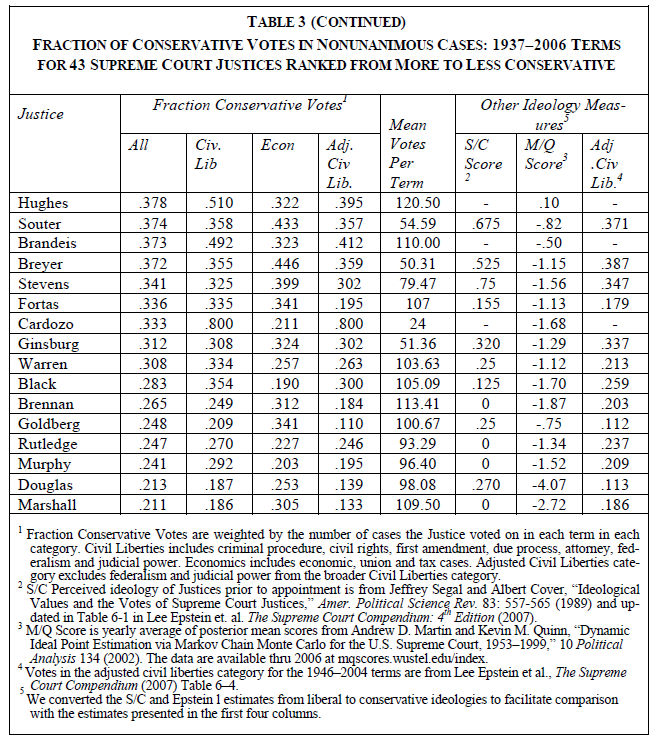 [Link]
[Link]
Thomas is THE most conservative justice since 1937.
Scalia is the most conservative of 3 of 43 court justices since 1937 or in the top 7% of conservatives since 1937 based on his actual decisions.
Roberts is the most conservative of 4 of 43 court justices since 1937 or in the top 9% of conservatives since 1937 based on his actual decisions.
Alito is the most conservative of 5 of 43 court justices since 1937 or in the top 12% of conservatives since 1937 based on his actual decisions.
Kennedy is the most conservative of 10 of 43 court justices since 1937 or in the top 23% of conservatives since 1937 based on his actual decisions.
In “Rational Judicial Behavior: A Statistical Study,” Posner and Landes use a database that includes the political background and voting records of the past 70 years of Supreme Court justices—who appointed each justice and how the justices decided every case—to come up with a ranking, from most conservative to least conservative, of the 43 justices who have served on the court since 1937.
Their conclusion: Four of the five most conservative justices to serve on the Supreme Court since Franklin Roosevelt, including Roberts and Alito, are currently sitting on the bench today. Justice Anthony Kennedy, another current Republican appointee, is ranked No. 10. (The table has a full list.) Justices Ruth Bader Ginsburg and Stephen Breyer, the two current justices nominated by Democratic presidents, are among the 15 “least conservative” justices of the past 70 years. Thurgood Marshall, who became the first black Supreme Court justice when he was appointed in 1967, has the most liberal voting record on the list. Clarence Thomas, the second black justice, who was appointed to the court in 1991, is ranked the most conservative. [Link]
This chart shows that the Robert’s Supreme Court is the most conservative since 1937:
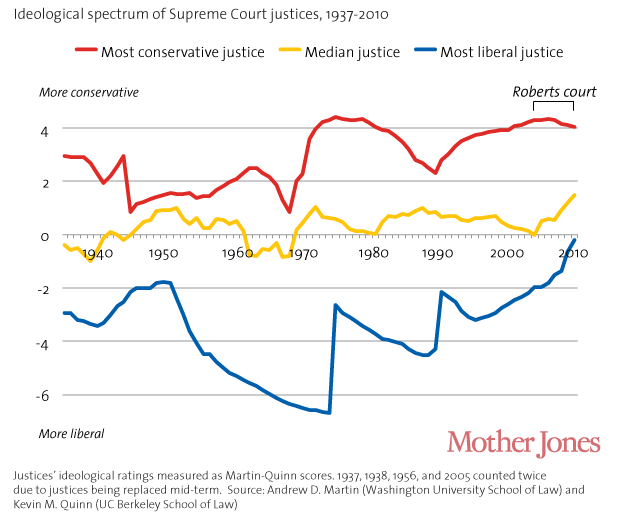
Mother Jones [Link]; See how liberal and conservative is defined here by the Supreme Court Database.
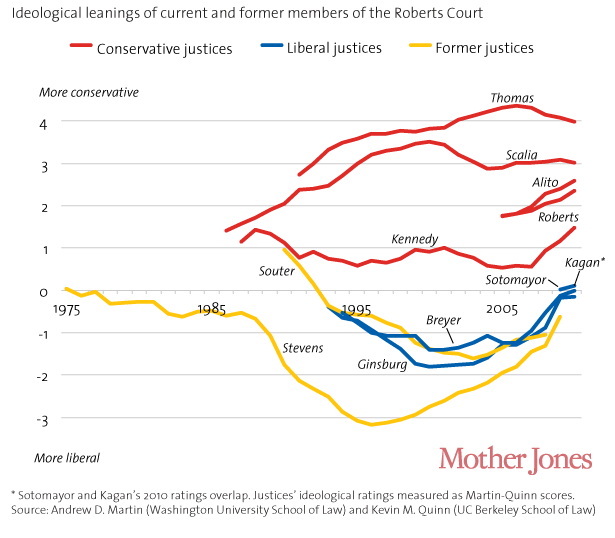
Mother Jones [Link]; See how liberal and conservative is defined here by the Supreme Court Database.
Here is another set of data illustrating the conservative history of the court relative to the Robert’s court:
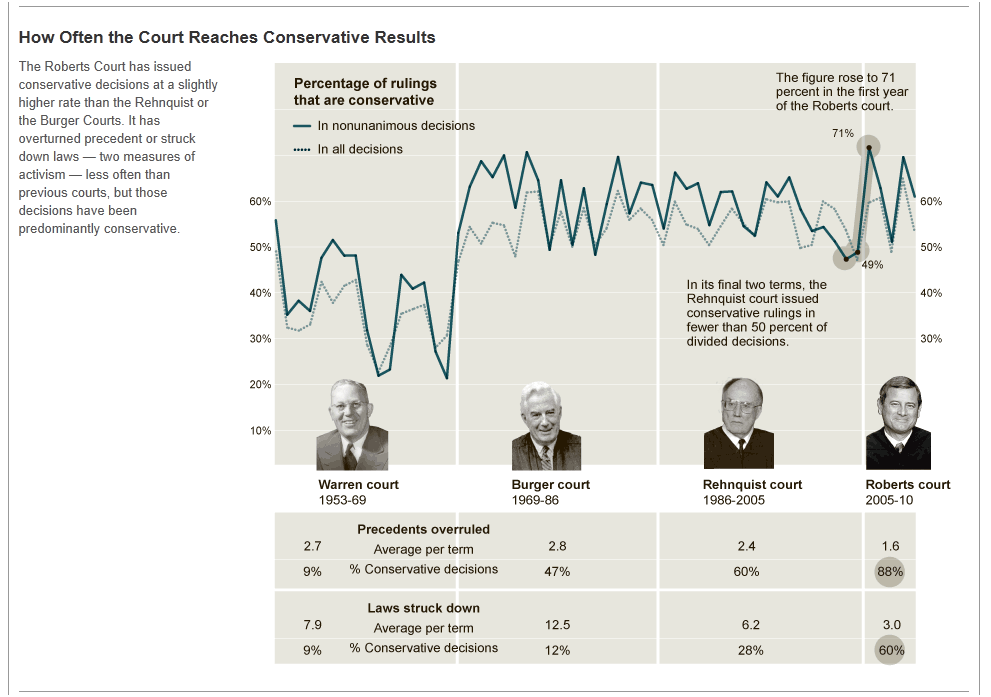
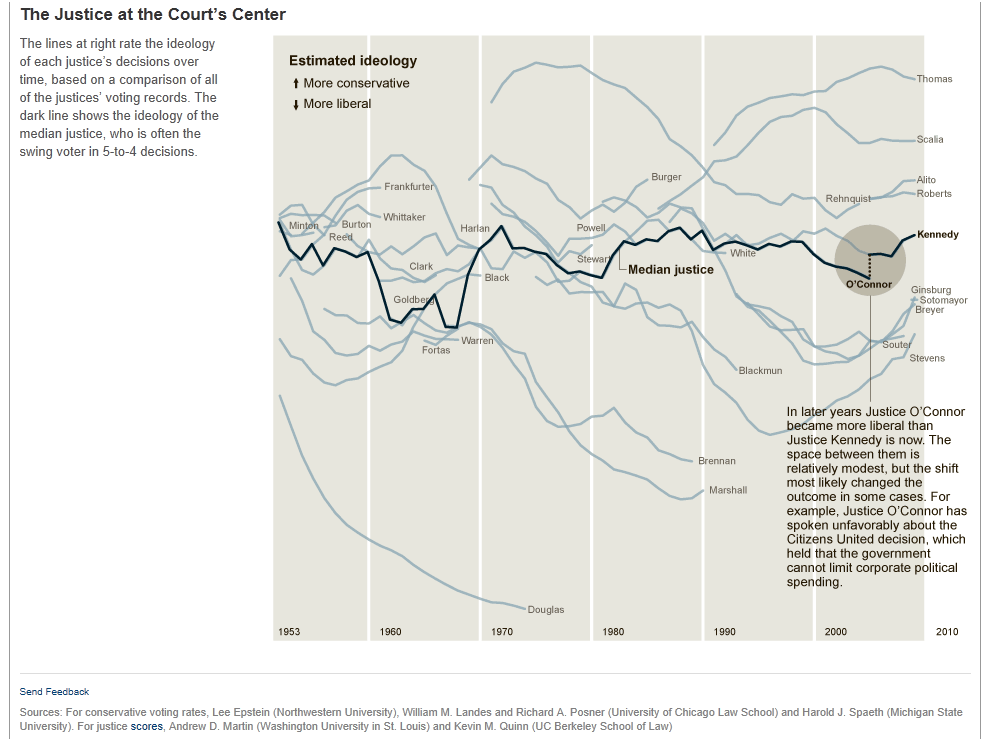 [Link]
[Link]
Here is more data on the ideological history of the court:
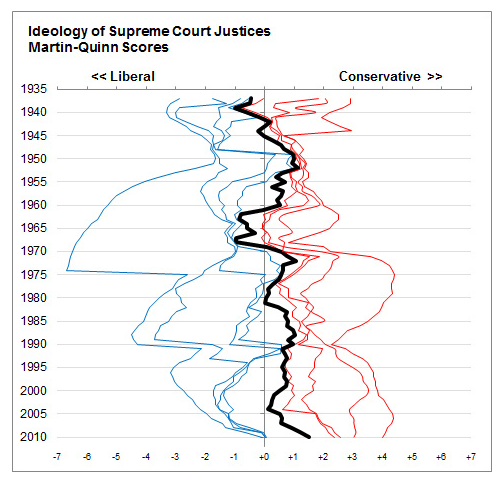 Martin-Quinn Scores [link]
Martin-Quinn Scores [link]
More charts updated to September 25, 2012 are shown here: Link, Link
“By several measures, the court headed by Chief Justice John Roberts is the most conservative since the early 1970s, when Richard Nixon named Warren Burger to replace the famously liberal Earl Warren. Not only is its most conservative member (Clarence Thomas) nearly as conservative as the Burger court’s most conservative member (future Chief Justice William Rehnquist), its most liberal member (Ruth Bader Ginsburg) is considerably less liberal than previous justices on the left side of the spectrum.”
“Between 2005 and 2010, most of its five conservative-leaning members became more so. Additionally, liberal Justices John Paul Stevens and David Souter were replaced by Sonia Sotomayor and Elena Kagan, who may turn out to be less liberal than their predecessors.” Mother Jones [Link]
“But scholars who look at overall trends rather than individual decisions say that widely accepted political science data tell an unmistakable story about a notably conservative court.” New York Times [Link]
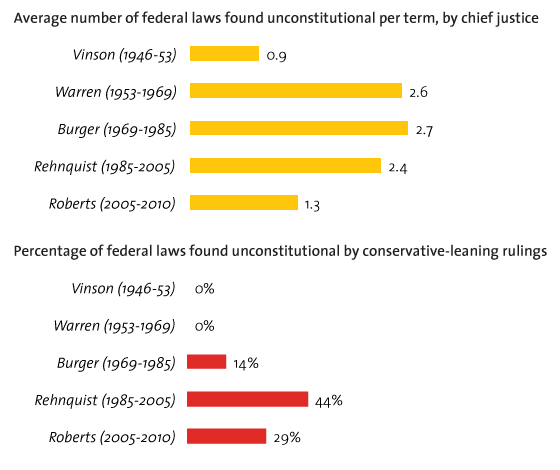
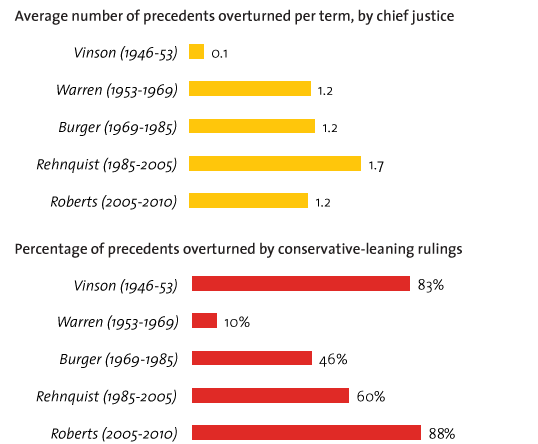 Mother Jones [Link]
Mother Jones [Link]









